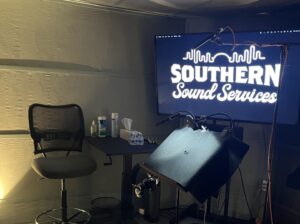ADR
It can take considerable focus and skill for an actor to exactly match not only the timing but also the performance from when they shot the scene. It is our mission to facilitate this process in a way that supports

the actors to perform at their best and provides a clean recording for the post-production team to work with.
ADR which stands for "Automated" or "Automatic" Dialog Replacement also called looping is a process where the dialog from actors is re-recorded in a more controlled and quieter setting after filming a scene. Usually in an ADR studio also called an ADR stage such as ours which is properly equipped and set up to record dialog without any environmental sound being present. Without any environmental sounds in the recording, the sound editor and re-recording mixer can manipulate the voice to fit in any situation or location in the sound mix.
Here are some of the many reasons to record ADR for your film or project.
- Dialog recordings that are unintelligible or that has too much background noise was recorded on set. Most producers and directors prefer to avoid ADR if they can, but locations with noisy environments like city streets, the beach, or wind and rain can be very difficult to work with. Also, action scenes with lots of actor movement can be difficult to get good dialog recordings even in an ideal location for sound. This makes post production sound a challenge when the dialog editor can not create a clean dialog track. Lavalier bumps and jostling of clothing can ruin the sound of what would have been a great take. Sometimes if the lavalier can not be used and the boom is too far away the dialog can sound distant and "roomy" which will need to be replaced.
- Enhancing the performance or plot by replacing or adding lines. Sometimes the tone of a scene can change in the edit so a line that sounded right on set might not work as well in the new cut. Or during picture editorial, you feel like a scene could use added dialog to enhance or explain a plot point.
- Often, to fit their character actors must use various accents. And sometimes a preferred take on film might catch the actor's dialog coming in and out of the character's accent. Re-recording through ADR can give the actor and director a new chance to enhance and accentuate an accent that was difficult to capture at the moment of filming.
- Loop group and secondary characters. To properly capture the main actor's dialog, film sets are kept as quiet as possible. When there are other actors in the scene, say at a restaurant, party, or any crowd the background actors often mouth words but stay silent. Loop group or group ADR is then recorded later where actors record the dialog of what is seen on screen. This also gives control of what is said to fit the time and location of the film.
- TV, airline, and versions without profanity. Some distributors will require alternate versions of a film without profanity or adult language. These are typically shown on broadcast TV and during airline flights.
